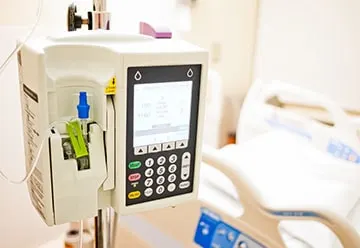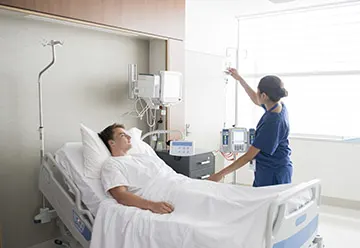How Smart Pumps Reduce Medication Errors In Healthcare Settings

Since the late 1960s, infusion pumps have been used to deliver controlled amounts of fluids (like medications and nutrients) into patients' bodies for a variety of reasons. They are used in a wide variety of healthcare settings to infuse everything from hormones to pain relievers. Their effectiveness relies on their ability to deliver these fluids in precise volumes and rates at very specific times. Many of these fluid medications have high-risk designations, meaning that any sort of deviation from its intended use could have drastic consequences for both patients and caregivers.
With traditional infusion pumps, there is a serious potential for user error. These errors can occur when the clinician is programming delivery rates and volumes for each infusion. And according to the Anesthesia Patient Safety Foundation, adverse drug interactions are the single leading cause of medical injuries. The FDA also received 56,000 reports of adverse events that were associated with infusion pump use from 2005 to 2009, when traditional infusion pumps were really the only kind available.
Fortunately, that's no longer the case. Smart pumps, much like other types of smart technology, automate a substantial amount of the process, meaning that it's much more streamlined and safeguarded. These smart pumps reduce the risk of errors through programming and alerts, which will let medical personnel know if there is a risk of an adverse reaction between medications or if the programmed parameters are programmed outside of hospital protocols.
These high tech pumps incorporate multiple drug libraries specific to each care area to ensure that concentrations, dosing units, and dosing limits are all taken into account. These libraries are created and maintained by the facility's own pharmacy department. After a clinician designates a care area, the correct drug library ensures that limits are not exceeded in unsafe circumstances. These smart infusion pumps have other safeguards too, such as ones that will not allow certain factors to be taken into account if it's not determined to be appropriate (i.e., a patient's weight if the medication is not dosed with that in mind). While "soft" limits can be overridden, "hard" limits cannot, thus reducing some of the most serious medication errors. These pumps also log all alerts, which allows the facility to track any errors in programming or potential problems that were stopped thanks to the device.
In a piece published by Christiana Care News, Dean Bennett, RPh, CPHQ, LSSGB, and medication safety officer, explained: "Most of the preventable errors that cause patient harm involve the administration of medications... This [smart pump system] eliminates the manual programming of the pump, which is where errors occur. It is the perfect thing for a computer to do -- and also will allow our nurses to focus more time on the things that human beings do best."

To that end, infusion pumps such as Alaris smart pumps do more than keep patients safe; they can also improve the workflow in medical facilities and allow staff members to continuously improve their work. Generally speaking, smart pumps are more efficient than traditional models, meaning that personnel will have more time to devote to patient care rather than programming pumps while ensuring medications will have no adverse reactions.
The reality is that pumps like these will continue to be ubiquitous in hospitals, nursing homes, and all sorts of other healthcare facilities. Our dependence on these devices will not wane, but because more facilities are shifting their reliance to smart pumps over the traditional, error-prone models, there's an increased protection for both staff members and patients.
